Pharmacy Plans Not Coming True?
 Can you believe January is almost over? Do you ever make resolutions & forget them by the 3rd week? There’s nothing more frustrating than making the same resolutions over & over again, and not seeing them come true.
Can you believe January is almost over? Do you ever make resolutions & forget them by the 3rd week? There’s nothing more frustrating than making the same resolutions over & over again, and not seeing them come true.
Tired of making plans for your pharmacy or department that don’t come true?
Here are the first 3 steps that most pharmacy directors or leaders overlook when creating a plan for the year. Doing these 3 steps BEFORE planning for action steps will juice up your vision & allow it to come true more naturally this year. It will not only inspire you, but your pharmacy staff also.
Download the simple worksheet here.
Write on one sheet the following:
1. Why you are doing what you are doing
Example: “I am a ________________ (ie, pharmacy director/contract specialist) because ____________(your “why”)
(I am a pharmacy manager because I want to run a pharmacy where patients are well-cared for & can count on us for getting the best mediation options they can get)
2. Your vision for your pharmacy/department by the end of the year.
Example: “We are helping # patients/mo by helping them quit smoking & breathe easier.”
3. Write down the things that worked well & didn’t work well last year. This is a great opportunity for you to reflect on all the things that went well & acknowledge yourself (and others) for. Then write down what you choose to maximize or minimize doing.
 Maximize things that worked well, or contributed to your team getting along well with each other. Minimize things that didn’t support your vision. It can include habits like procrastinating, not keeping your word (however small), coming in late, or complaining. It’s small leaks in every individual (including yourself) that contribute to a bigger problem of things not working well in your pharmacy. You set an important example for your pharmacy with your actions, whether you realize the extent of it or not.
Maximize things that worked well, or contributed to your team getting along well with each other. Minimize things that didn’t support your vision. It can include habits like procrastinating, not keeping your word (however small), coming in late, or complaining. It’s small leaks in every individual (including yourself) that contribute to a bigger problem of things not working well in your pharmacy. You set an important example for your pharmacy with your actions, whether you realize the extent of it or not.
This 3-step process is very effective to write down, before you break your vision down into next action steps.
Fill out the worksheet this for yourself and ask your staff to do it also.
**Now don’t miss this final step (ok, so it’s actually 4 steps 🙂 ): Post this up on your wall. This is the key between you having trouble with reaching your vision, vs. it coming true faster.
Enter your name and email below to get instant access to the worksheet download:
Annoyed by Your Pharmacist Co-Workers?
 Annoyed by your co-workers? Ever wonder why some people just rub you off the wrong way & trigger an emotional reaction by you? But someone else saying other derogatory words don’t hurt you?
Annoyed by your co-workers? Ever wonder why some people just rub you off the wrong way & trigger an emotional reaction by you? But someone else saying other derogatory words don’t hurt you? Working in a pharmacy often means working in a close-knit environment with co-workers and working with those who may push your buttons. It is an opportunity to learn to embrace a part of yourself that you may not see in yourself. I remember working at a pharmacy when I felt micromanaged by another pharmacist. Whatever I did, I felt like he was looking over my shoulders even though he was not my supervisor. I would feel annoyed. One day, I don’t even remember what he said to me, but it made me break down in tears.
Working in a pharmacy often means working in a close-knit environment with co-workers and working with those who may push your buttons. It is an opportunity to learn to embrace a part of yourself that you may not see in yourself. I remember working at a pharmacy when I felt micromanaged by another pharmacist. Whatever I did, I felt like he was looking over my shoulders even though he was not my supervisor. I would feel annoyed. One day, I don’t even remember what he said to me, but it made me break down in tears.
 Years later, looking back, I realize that I used to label him as controlling. At the time, I did not embrace the controlling side of me. Being controlling was something I viewed as being a despicable quality to have, and didn’t see myself having it. As humans, we actually have the capacity for the whole range of human emotion, including being controlling. But society teaches us that certain qualities are “bad” and others are “good”. As a result, we don’t embrace parts of ourselves that we feel are “bad”. When others act with a quality we label as “bad”, it can trigger an emotional reaction in us.
Years later, looking back, I realize that I used to label him as controlling. At the time, I did not embrace the controlling side of me. Being controlling was something I viewed as being a despicable quality to have, and didn’t see myself having it. As humans, we actually have the capacity for the whole range of human emotion, including being controlling. But society teaches us that certain qualities are “bad” and others are “good”. As a result, we don’t embrace parts of ourselves that we feel are “bad”. When others act with a quality we label as “bad”, it can trigger an emotional reaction in us.
That day, what he said to me triggered an emotional reaction that made me feel he was being controlling. When I eventually embraced the controlling side of me fully, I no longer attracted people into my life who made me feel they controlled me. Now I am able to make observations from a space where things that used to annoy me don’t trigger an emotional reaction in me anymore. It allows me to work with others from a renewed place on a daily basis. It is very freeing.
 Of course, I am human and continue to work on embracing parts of myself that I deny. Embracing parts of ourselves include not only what we normally view as “bad”, but also “good”. For example, you may not embrace the beautiful part of yourself. If this rings true for you, if someone says “you are beautiful”, you may say no, I’m not, or you may laugh it off, for example. This is a concept that is taught by Debbie Ford, author of New York Time’s Best Selling Book “The Dark Side of the Light Chasers: Reclaiming Your Power, Creativity, Brilliance, and Dreams.”
Of course, I am human and continue to work on embracing parts of myself that I deny. Embracing parts of ourselves include not only what we normally view as “bad”, but also “good”. For example, you may not embrace the beautiful part of yourself. If this rings true for you, if someone says “you are beautiful”, you may say no, I’m not, or you may laugh it off, for example. This is a concept that is taught by Debbie Ford, author of New York Time’s Best Selling Book “The Dark Side of the Light Chasers: Reclaiming Your Power, Creativity, Brilliance, and Dreams.”
When you incorporate this concept of dark and light, you can use in all areas of your life, to help you have more money, better health, intimacy, heal relationships, or make peace with a painful experience.Try incorporating this concept in your daily work life. The next time someone annoys you, observe what it was about that person annoyed you. Maybe it was because that person was angry and yelled loudly at you. Look inward and see if you can have that capacity to be angry, or if you deny that possibility in yourself to get angry to that capacity. The more you grow to expand your capacity to feel fulfilled and embrace all aspects of yourself, the less external situations will affect you. Things your co-worker used to do that annoyed you will no longer bother you.
Comment below on what you’ve done when you’ve been annoyed by your pharmacy co-workers, or what you’ll do differently now that you’ve read this article.
Why Your Pharmacy Staff Doesn’t Communicate with You
 What do you think pharmacy staff polled across the country said about the common reasons they don’t bring their ideas to pharmacy management?
What do you think pharmacy staff polled across the country said about the common reasons they don’t bring their ideas to pharmacy management?
The top two so far are this:
1. “They don’t understand the workflow”.
2. Click here for reason #2
Here are a few quick tips on what to do differently for both scenarios:
1. “They don’t understand the workflow”:
As a pharmacy supervisor, spend some time on the line to understand how things work from the staff pharmacist’s perspective. Not only will this help you stay in touch with what your staff experiences, but you will also benefit from being able to come up with even better ideas to run the pharmacy well.
Have you seen the TV show “Undercover Boss”? If you haven’t seen that show before, these CEOs of large companies like Frontier Airlines go and work undercover as an employee for a day, so they can experience what their staff experiences. The CEO comes back with renewed appreciation for their staff and ideas they wouldn’t have thought about otherwise. Now, you may not work at a place big enough to be an Undercover Boss, so you will have to blow your cover and just work on the line with everyone knowing you are the boss.
 “Take this action” tip: Don’t just sit in your office all day. Your staff don’t get what you do in there, even if you do a lot. Come out once in awhile, work with them, and show that you still understand what they’re going through.
“Take this action” tip: Don’t just sit in your office all day. Your staff don’t get what you do in there, even if you do a lot. Come out once in awhile, work with them, and show that you still understand what they’re going through.
Take the time to ask your employees what areas they think could run a little smoother to show that you are actively interested in improving things and listening to ideas.
2. “They say it’s a great idea, but nothing happens”.
The problem with this may be twofold: either you feel it’s a great idea, but it doesn’t get implemented (due to the timing or due to other circumstances that don’t allow it to happen). Or you really don’t think it’s a great idea, but you tell them it’s a great idea just to make them feel good in the moment (even though you well know you won’t be using their idea).
If you plan to implement it:
If you want to implement an idea, but can’t right away, let your pharmacy staff member know that it’s something you plan on doing in a specific time frame. Or, if you need to look into things more before making a decision, have another conversation with them to let them know an update on the feasibility of implementing their ideas.
If you like it, but don’t plan on implementing it:
If you like a pharmacist (or tech’s) idea but aren’t able to implement it at all, have a follow-up a conversation with them and acknowledge their idea again. Show your appreciation for them wanting to help improve things in the pharmacy. Tell them why their idea wasn’t used, and ask them for additional ideas. This shows that you paid attention and also encourages further input.
If you don’t like it, and don’t plan on implementing it:
Tell them the truth. Hear them out first and acknowledge their idea. Tell them why it’s not able to be implemented in the big picture of things. But that you appreciate their idea. Ask them if they have another idea about how something else could be better…or if they have an alternative idea that could be used.
What makes you unhappy about your current pharmacy job?
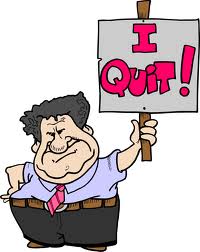 From talking to thousands of pharmacists over the years, I’ve heard many stories about what makes a pharmacist decide to leave their job. We recently told pharmacy directors the common reasons for their pharmacists’ job dissatisfaction. That way pharmacy directors can think about doing things differently. Read below and tell me what you think by posting your comment below. Do you agree?
From talking to thousands of pharmacists over the years, I’ve heard many stories about what makes a pharmacist decide to leave their job. We recently told pharmacy directors the common reasons for their pharmacists’ job dissatisfaction. That way pharmacy directors can think about doing things differently. Read below and tell me what you think by posting your comment below. Do you agree?
What are the main reasons you left your last position (or are considering to leave your current one)?
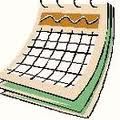
The biggest complaint pharmacists share with me about why they leave their jobs is because of issues with the schedule. The most commonissue is becoming tired of a variable schedule, because it makes it hard to plan a personal life. It’s harder to plan taking fun classes/workshops, organize rides for kids related to school activities, and coordinate time to hang out with friends or family. Not knowing the schedule far in advance is another issue.
Another common reason for deciding to leave a job is not feeling valued by pharmacy management. Many pharmacists feel management does not acknowledge and recognize them for their contribution. It’s also frustrating when management doesn’t listen to feedback.
Finally, a third reason why pharmacists leave their current job is the lack of opportunity to grow professionally. They’re pigeon-holed into a position and their strengths and interests aren’t able to shine through. For example, the pharmacists don’t see it possible to do more clinical work, grow their management skills, or do more of what they enjoy doing in their current roles.
Ready to leave your job, or thinking about it? Find out your options. You may qualify for a pharmacist job market expert (who has the “in” with pharmacy directors) to network on your behalf for positions that interest you.
Comment below on whether you agree with the top reasons why pharmacists tend to leave their jobs. And if you’re unhappy now, why do you want to leave?
Comments are accepted anonymously if you don’t want anyone to know who you are!
Weed Out the Wrong Fit – 7 Reference Questions You Never Thought to Ask (Updated July 2013)
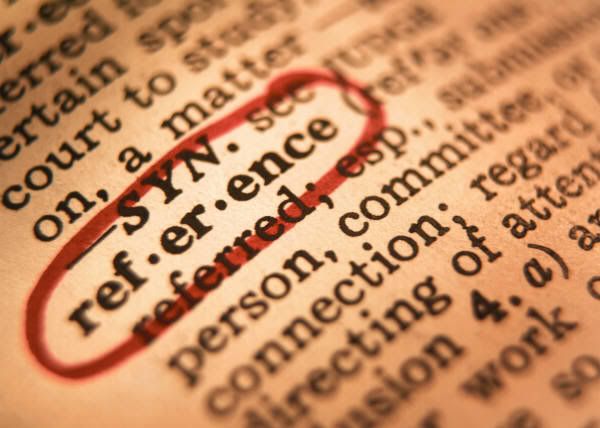 Pharmacy directors/hiring managers: do your reference questions help weed out the wrong fit, or do you not pay much attention to them especially if you like the candidate? References are a goldmine not only for determining fit, but also for how to bring out the best in a new hire once he/she starts.
Pharmacy directors/hiring managers: do your reference questions help weed out the wrong fit, or do you not pay much attention to them especially if you like the candidate? References are a goldmine not only for determining fit, but also for how to bring out the best in a new hire once he/she starts.
When my company asks reference questions to pharmacy directors about candidates who’ve worked under their supervision, we often get pharmacy directors making comments like “these are good questions—I’m writing some of your questions down to ask during reference checks!”
Since quite a few of you have asked me for this, I’ve decided to let you in on a few of my secrets about asking the right reference questions to weed out the wrong fit:
Bonus questions to ask:
Ask creative questions to gain valuable insight on how to work best with your new prospective hire:
- “What advice do you have for someone who would be managing him/her?”
- “What untapped talents do you think XXX has and is waiting to be expressed?”
*The 7th best reference check question will be selected from your submissions below & posted here. Post below and receive your gift of the top 20 Interview Questions to Ask.
Also, ask proficiency-related questions if it’s important. And don’t just stop at asking them to rate proficiency level. Go a step beyond to get clarification about their proficiency level. Ask them to describe what the pharmacist is capable of doing. For example, don’t just stop with asking your reference for whether someone is just proficient/good/average/poor using a computer system.
I made the mistake recently about this & it blew up in my face. What was answered by the reference was not representative of the person’s actual experience. Imagine how awful I felt misrepresenting a pharmacist’s experience to a hiring manager (especially when hiring managers usually love us for our honesty).
The key is learning from each mistake and always improving your process. It will make you eagle-eyed with assessing the wrong fit and prevent you from headaches down the road.
Now that you’ve learned a few of my favorite reference questions to ask, share 1-2 of the most useful reference check questions you have used in the past in the comments below. Post a comment below (when you type in your email, it will remain private and will not show up on the blog) and you will receive a gift of the “Top 20 Questions to Ask in an Interview, so you hire the best pharmacist.”
Where Every Pharmacist Wants to Work
 Wouldn’t it be nice if instead of having to wait for applications when you post a new pharmacist position, that you would already have a network of qualified pharmacists you could call? Could you imagine all the time you would save from having to sift through those piles of resumes and applications?
Wouldn’t it be nice if instead of having to wait for applications when you post a new pharmacist position, that you would already have a network of qualified pharmacists you could call? Could you imagine all the time you would save from having to sift through those piles of resumes and applications?
Be known as the place pharmacists want to work.
When I share new pharmacist job opening with pharmacists, they often ask me where it’s at. And sometimes they’ll tell me right away “I wouldn’t want to work there because they (the pharmacy director) tell you you’d be working one kind of schedule when you interview, and then they make you work other schedules once you’re hired. It’s like bait and switch.” Or the pharmacist I talk to would tell me “I like everything about the job, but not the schedule.”
 The biggest complaint pharmacists share with me about why they leave jobs is because of the schedule. The most common issue is being tired of a variable schedule, because it makes it hard for a pharmacist to plan their personal life. It’s harder to plan taking fun classes, organize rides for kids related to school activities, and coordinate time to hang out with a significant other more. Not knowing their schedule far in advance is another issue.
The biggest complaint pharmacists share with me about why they leave jobs is because of the schedule. The most common issue is being tired of a variable schedule, because it makes it hard for a pharmacist to plan their personal life. It’s harder to plan taking fun classes, organize rides for kids related to school activities, and coordinate time to hang out with a significant other more. Not knowing their schedule far in advance is another issue.
Tip #1: If you can make your pharmacists’ schedules more consistent and give them access as much in advance as possible, you will be known as an employer who has desirable shifts for their pharmacists. You will attract good pharmacists who are good at what they do, but have trouble balancing their life with the rotating & variable shifts in their current job.
Action step to implement: Think about what you can do about the schedule. One hospital pharmacy director saw his retention rates go up significantly when he added a 7 on/7 off staff pharmacist evening shift. The 7 on/7 off evening shift covers the less popular shifts of evening shift & weekend shifts. Plus, his pharmacists love having 7 on/7 off schedule without having to work nights. Contemplate this idea to see if it would help with pharmacist satisfaction at your pharmacy.
Tip #2: Be known as the #1 place pharmacists work at if they want professional growth.
 Many pharmacists love the opportunity to grow professionally. This doesn’t mean just clinically, but to develop as a person. Find out what your pharmacists’ strengths are, and foster growth in that area. It is a very individualized plan—it could be related to pharmacy management, clinical projects, coming up with ideas to improve workflow, patient care, or reducing time it takes to dispense medication, etc. Allow them the autonomy of taking on one project at a time. They could be small projects but important ones. They could also be part of a team in your pharmacy that brainstorms & implements that project together.
Many pharmacists love the opportunity to grow professionally. This doesn’t mean just clinically, but to develop as a person. Find out what your pharmacists’ strengths are, and foster growth in that area. It is a very individualized plan—it could be related to pharmacy management, clinical projects, coming up with ideas to improve workflow, patient care, or reducing time it takes to dispense medication, etc. Allow them the autonomy of taking on one project at a time. They could be small projects but important ones. They could also be part of a team in your pharmacy that brainstorms & implements that project together.
If you take the time to do this with each of your pharmacists, chances are that you will have pharmacists who stay with you year after year. You develop a relationship with your team and they feel you really care about them. Pharmacists who feel cared for will less likely leave their jobs, even if what seems like a better opportunity comes up.
Even while doing everything to be the best place to work, you may sometimes find yourself having an important job opening you want filled with the right pharmacist as soon as possible. Fortunately, you are in a better position than a pharmacy that doesn’t have as strong reputation than you. But you may still not have enough connections with the most experienced pharmacists to fill your opening. Don’t worry, because there are experienced and qualified pharmacists you can open yourself up to. Find out your options.
Action step to implement to become the place where every pharmacist wants to work: In your next staff meeting, share what your vision is about them growing professionally. Hand out a worksheet for them to fill out that helps them identify and acknowledge their strengths & what they are interested in doing more of professionally. Also during your staff meeting, ask your staff think could be done better about your pharmacy. Pick out the top 3 initiatives to work on in the next quarter.
When You Know You’re Bombing an Interview
 Have you ever been in an interview when you knew you were progressing down the path of bombing it? I can think back to when I had interviewed for a coveted summer internship with Merck and I knew I had bombed the interview while I was still interviewing. A handful of interns were to be chosen nationally for a internship that included many benefits, including an opportunity to work on a special project at Merck, meeting the CEO, a summer in a different part of the country with flights, rental car, and hotel paid for, etc.
Have you ever been in an interview when you knew you were progressing down the path of bombing it? I can think back to when I had interviewed for a coveted summer internship with Merck and I knew I had bombed the interview while I was still interviewing. A handful of interns were to be chosen nationally for a internship that included many benefits, including an opportunity to work on a special project at Merck, meeting the CEO, a summer in a different part of the country with flights, rental car, and hotel paid for, etc.
I had wanted the internship so badly. But the way the interview was going, I could feel myself kissing goodbye to the opportunity. It was as if I were a Stepford wife at times. Other times, I drew blank stares when asked some simple questions. I had also had 2 other interviews with two other Merck employees that went well, but this one was just plain embarrassing.
 So what do you do when you’re in a similar situation? What do you do when you’re in a pharmacist job interview and you say something you knew you shouldn’t have said (or you wish you said it differently)?
So what do you do when you’re in a similar situation? What do you do when you’re in a pharmacist job interview and you say something you knew you shouldn’t have said (or you wish you said it differently)?
Here is a simple solution to save the interview:

Shift your mindset right away: “Unclutch” from your mind starting to give yourself a hard time about why you’re bombing the interview. Observe your thoughts coming up and then let it go (“unclutch” from them). Otherwise, you may find yourself getting distracted from the rest of the interview questions. This can take you away from being completely focused and acing the rest of the interview. You are perfectly capable of saving the rest of the interview. The truth is
What to say to save that part of the interview: Bring up what you answered (the part you bombed) and clarify what your answer was. Elaborate on anything you meant to say but didn’t; explain what you said which you didn’t mean to say.that most interviewers know that people get nervous. As long as you regroup your thoughts, you can save the interview.
What if you are answering questions and can just tell that the interviewer isn’t impressed with your answers?
Acknowledge the interviewer’s reaction artfully. Depending on whether it’s appropriate in that moment or at the end of the interview, ask your interviewer “are there any concerns you have about me XXX [insert the topic during which you noticed the interviewer wasn’t impressed] or doing the job well?” Depending on what the interviewer says, then bring up examples that may help dissolve their concerns.
Stay tuned for a future article that will give you the answers to a few other interview questions I’m frequently asked (including “Should you acknowledge that you are messing up the interviewer?”). I will also share with you what happened with my bombed interview at Merck & whether I got the job there that summer, if you’re curious.
 In the meantime, if you are looking for a job right now and don’t want to make easily preventable mistakes that make you lose out on a job you really want, here is my gift to you…Access your free gift: the 5 Biggest Mistakes Pharmacists Make in a Job Search. Put your name & email in the box after you click on the link above, and you will get valuable free tips that can help you stand out from everyone else. Good luck with your upcoming interviews and use the resources on this website to help you beat your competition.
In the meantime, if you are looking for a job right now and don’t want to make easily preventable mistakes that make you lose out on a job you really want, here is my gift to you…Access your free gift: the 5 Biggest Mistakes Pharmacists Make in a Job Search. Put your name & email in the box after you click on the link above, and you will get valuable free tips that can help you stand out from everyone else. Good luck with your upcoming interviews and use the resources on this website to help you beat your competition.
Will My IHS Pharmacy Have to offer mail-order services?
Last month you read about how using the VA Consolidated Mail Outpatient Pharmacy (CMOP) for mail-order prescription services in IHS may affect pharmacy staff size. From what we learned during our interview with CAPT Pam Schweitzer, IHS-VA National CMOP Coordinator, the plan is for most sites to stay at the same staff size or to even increase. We asked you what you thought in our poll, and 70% thought that it wouldn’t increase.
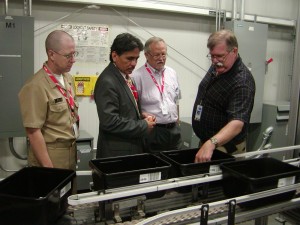
Phoenix Indian Medical Center staff visiting the VA CMOP Leavenworth
Another frequently asked question about the program is “Will my pharmacy HAVE to offer mail-order services & use CMOP?” We discussed this with CAPT Schweitzer, and she took the time to address some of thse important and valid concerns:
Q: Will IHS require every site to get on board with CMOP?
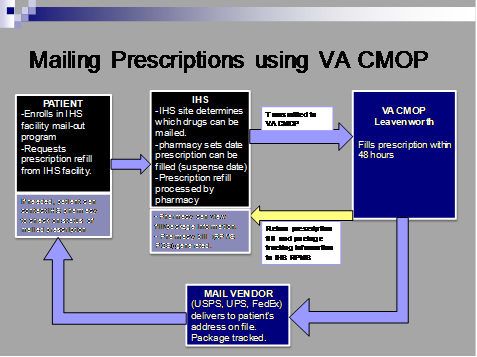
 Q: Will the tribes have an opportunity to get on board with CMOP?
Q: Will the tribes have an opportunity to get on board with CMOP?
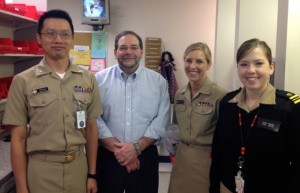
Ken Siehr, National CMOP Director snapped this photo of the staff when he stopped by Phoenix Indian Medical Center
Q: Which IHS sites are already implementing CMOP services?
Being Committed But Not Attached
 It used to drive me crazy. I would talk to experienced pharmacists who would tell me about issues they were having with their job search. They would apply to places they wanted to work at and then either 1) not get invited in for an interview, or 2) not understand why they didn’t get the job even after what seemed like a good interview.
It used to drive me crazy. I would talk to experienced pharmacists who would tell me about issues they were having with their job search. They would apply to places they wanted to work at and then either 1) not get invited in for an interview, or 2) not understand why they didn’t get the job even after what seemed like a good interview.
After talking to them for a bit, I could see how I could help them. A feeling of excitement and “oh—I could solve your problem!” would bubble up inside me when I knew that some simple (yet not always obvious) changes would have made the difference between getting offered a job or not.
Because of the challenges I saw experienced pharmacists having, I started to teach some underused, yet effective, strategies that can be used to either hear about jobs before they come out, or get noticed when applying for a job. I would tell the frustrated pharmacists about how I taught this in the bootcamps I offered, and that they didn’t need to worry because I could help them. In my excitement, they sometimes got offended because they felt I was “selling” what I had to offer to them. Sometimes they got turned off because they felt I wanted to make money off them.
We would hang up, and then I would see them continue to do what they had always done –making the same mistakes in their job search and missing out on jobs they deserved. Sometimes they would come back to me later when they finally realized the cost of taking time trying to figure it out themselves.
I learned from my experiences that being more committed to them than they were about turning things around with their job search was not an attractive thing. Aside from that, I think I came across a bit too “salesy.” I was confident in what I offered—I knew they couldn’t learn what I teach anywhere else. I have not seen other pharmacist recruiters willing to teach the secrets they know about how to get your foot into the door. Also very few recruiters are pharmacists themselves. Yet my passion to teach pharmacists how to improve their chances for getting a job actually got in the way of them deciding to learn from me. Although it was hard at first, I eventually let go of being attached to their success.
Now I am committed but not attached. If pharmacists recognize they want expert help in saving them time and lost job opportunities, that’s when I share how they can learn what to do differently. If they choose to figure it out themselves, I completely honor their decision.
As a result, the pharmacists who learn from me are the most committed and often write me, thanking me for shifting their job search approach and helping them get the job they wanted. Many of them are pleasantly surprised with what was taught, especially in the Hidden Job Market Bootcamp, which include strategies they can use throughout their pharmacy career to be in “the know” and hear about jobs before their competition.
You can apply my concept of “being committed but not attached” to your job search. Sometimes you may come across job opportunities that you are excited about, but the employer doesn’t seem to be interested in you because they’re not responding. It might drive you nuts because you know they could be a good match for you, if only they gave you a chance. Sometimes you have the opportunity to influence the decision and you just need to learn how to do it in an elegant way. Rather than writing it off as that it’s simply because of the tough job market that you didn’t get a shot, redirect your energy to figuring out what to do differently to get noticed.
The key is to be totally committed. If you’re half-assing it and sending out resumes to 10 different places just because you need a job, that doesn’t spell commitment. If you say you are committed, but you don’t take the time to get to really know what you’re applying for and to personalize your approach to capture the attention of a hiring manager, then you have a deeper commitment to something else. Your deeper commitment reflects hoping things will turn out, rather than putting your best foot forward and then letting things fall into place for you.
So be committed. After that, don’t be attached to where you end up, because what happens will just be perfect when you know you’ve tried your best. Even if you can’t see it now, when you look back, you will see how it was all an important part of your path. Just as some of you being “turned off” by me was an all- important part of my path to working with those I enjoy most working with.
To learn how to find out about jobs before they come out, listen to the free preview call:
“How to Tap into the Hidden Job Market to Beat Your Competition to the Interview”.
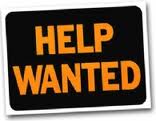 An Indian Health Service site called us recently & requested an experienced IHS contract pharmacist because their permanent pharmacist left unexpectedly. They’ve had trouble keeping the last 2 pharmacists they’ve hired. Each time they went to look for a pharmacist, they were in a crunch. Have you been in that place before, when you had to hire someone because you had a need, and then your new hire didn’t end up staying for long?
An Indian Health Service site called us recently & requested an experienced IHS contract pharmacist because their permanent pharmacist left unexpectedly. They’ve had trouble keeping the last 2 pharmacists they’ve hired. Each time they went to look for a pharmacist, they were in a crunch. Have you been in that place before, when you had to hire someone because you had a need, and then your new hire didn’t end up staying for long? 1. The best time to look for a new hire is when you don’t need one. That way, you can be making connections without that sense of urgency clouding your judgment. Network with pharmacists you meet at different conferences & trainings –ones that you feel could be a great addition to your team . Talk to them proactively about the possibility of working at your IHS/tribal facility (whether now, or down the road).
1. The best time to look for a new hire is when you don’t need one. That way, you can be making connections without that sense of urgency clouding your judgment. Network with pharmacists you meet at different conferences & trainings –ones that you feel could be a great addition to your team . Talk to them proactively about the possibility of working at your IHS/tribal facility (whether now, or down the road).
